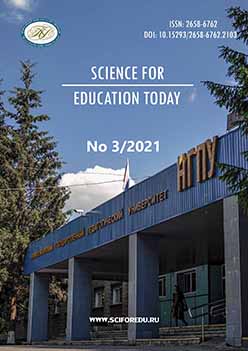Обзор исследований, посвященных изучению взаимосвязи использования цифровых устройств и развития когнитивной сферы у дошкольников
The relationship between the use of digital devices and cognitive development in preschool children: Evidence from scholarly literature
Author(s): Daria Alekseevna Bukhalenkova, Elena Alekseevna Chichinina, Apollinaria Vadimovna Chursina, Aleksander Nikolaevich VeraksaSubject(s): Media studies, School education, Educational Psychology, ICT Information and Communications Technologies, Sociology of Education
Published by: Новосибирский государственный педагогический университет
Keywords: preschool children; Digital devices; Media use; Cognitive development; Speech development; Mathematical skills; Executive functions; Screen time; Media Content;
Summary/Abstract: Preschool children are active users of digital devices, which affects their cognitive development. The nature of these impacts has not been sufficiently studied, and there are different opinions of experts on this issue. Thus, the purpose of this article is to analyze the findings of research investigations devoted to the impact of digital devices on preschool children’s cognitive development. Materials and Methods. The authors conducted a systematic literature review of 46 full-text research articles describing the relationship between the use of digital devices (screen time and media content features) and the development of speech and mathematical skills, as well as the development of executive functions in 3-7 year-old children. The review is based on the cultural-historical approach. Results. The analysis of studies has shown that the impact of using digital devices on preschool children’s cognitive development depends on screen time, the exposure type (background TV or targeted use of digital devices), the content (educational or entertaining content), age appropriateness (age-appropriate or inappropriate content), the extent of how realistic the content is (fantasy or realistic content), the stimulus material complexity (visual or audial, black and white or color). There are also conclusions about the most relevant prospects for further research on the impact of the use of digital devices on the cognitive development of children. Conclusions. The review has indicated that long screen time negatively affects the development of speech and mathematical skills and executive functions in preschool children. The study has revealed that the content impact on cognitive development depends on the characteristics of this content. In particular, children-oriented educational content can contribute to cognitive development. Adult-oriented content can negatively affect cognitive development.
Journal: Science for Education Today
- Issue Year: 11/2021
- Issue No: 3
- Page Range: 7-25
- Page Count: 19
- Language: Russian

